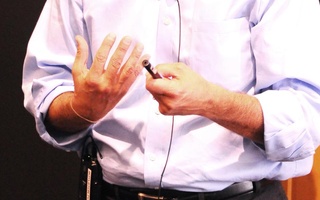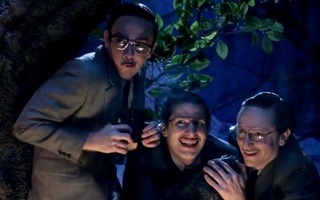Randomly assigning students to seats may be one way to crack down on academic dishonesty in the classroom, according to a new study.
Cheating continues to be a problem at Harvard and other colleges around the nation, according to the study, entitled “Catching Cheating Students” and published this month by the National Bureau for Economic Research.
Steven D. Levitt, the University of Chicago economics professor of “Freakonomics” fame, co-authored the study. He wrote in an email that he hoped the findings would indicate to people “how easy it is to cheat when no one tries to stop you, how easy it is to catch cheaters, and how easy it is to prevent cheating on exams if you try.”
In the study, Levitt and Ming-Jen Lin, an economics professor at the National Taiwan University, developed an algorithm “for identifying cases of students copying off one another’s exam answers” and tested it at an unidentified “top university in which the professor suspected cheating may have occurred.”
At least 10 percent of the class’s 242 students were said to have cheated on a midterm exam, and when they were assigned seats randomly for the final exam, “almost all evidence of cheating disappears.”
Harvard’s approach to addressing academic dishonesty in the classroom, especially on the heels of its largest cheating scandal in recent memory in 2012, was introducing an honor code, which went into effect at the beginning of the semester. {shortcode-e037e2373f15026f3ca022240660d76a508ebe9f}
Levitt said he is skeptical about the efficacy of honor codes in cases of academic dishonesty.
“I think honor codes are likely, if anything, to increase cheating,” Levitt wrote. “Mostly, what honor codes do is to lead teachers not [to] try to prevent cheating, which ultimately lead to more cheating.”
Since the unnamed American university in the study did not have an honor code, that factor was not included in the report, according to Levitt.
At Harvard, the study’s approach of randomly assigning students to seats may or may not have real merit in classrooms, depending on the size of a course, Philosophy Department Chair Edward J. Hall wrote in an email.
“[T]he simple idea of arranging seating during exams might be a good one,” wrote Hall, who was involved with the creation of the honor code. “I still have reservations, though, because unless it is clearly explained why the policy is in place, students might very naturally feel patronized, and distrusted. And that’s a reaction that works directly against the aims of having an Honor Code, in the first place.”
Hall made a distinction between “cozy” courses—small enough that students and the professor interact—and “anonymous courses”—in which students are simply faces in a large lecture hall.
“In a cozy course...the students—most of them, anyway—form enough of a connection to the professor and the rest of the teaching staff that open, honest conversation about academic integrity is possible and fruitful,” Hall wrote. “[T]his can create real trust—so that students come to feel that it would be dishonorable to cheat, and the professor thereby feels much less pressure to impose anti-cheating measures of the kind the article describes.”
Levitt said he thinks the study’s findings do not presage large changes for Harvard and its peer institutions.
“I don't think our study has much of a broader implication,” Levitt wrote. “People know there is cheating, and they know how to stop it.”
—Staff writer Melissa C. Rodman can be reached at melissa.rodman@thecrimson.com. Follow her on Twitter @melissa_rodman.Read more in College News
Student Activists Call Title IX Document ‘Totally Inaccessible’Recommended Articles
-
‘Looper’ Transcends Time Travel GenreWith clever film references galore, standout acting by Joseph Gordon Levitt and Pierce Gagnon, and the occasional laugh, “Looper” builds upon previous time travel films, rather than shallowly aping them.
-
 Levitt Stresses Early Socialization in Center on the Developing Child’s Lecture Series
Levitt Stresses Early Socialization in Center on the Developing Child’s Lecture Series -
 The Best Lonely Island Movie Adaptations That Haven't Been Made Yet
The Best Lonely Island Movie Adaptations That Haven't Been Made Yet -
 Five Questions About The Honor Code, Answered
Five Questions About The Honor Code, Answered -
At Honor Code Panel, Students and Faculty Talk Communication“The vast majority of faculty really do care, and the vast majority of students care. Yet I think a good portion of the time, we miss each other in unintentional ways,” said Brett Flehinger, the Honor Council’s secretary.













